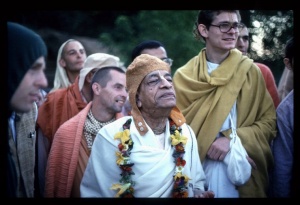SB 4.8.27: Difference between revisions
m (1 revision(s)) |
No edit summary |
||
| Line 1: | Line 1: | ||
{{info | {{info | ||
|speaker= | |speaker=Nārada Muni | ||
|listener=King Dhruva | |listener=King Dhruva | ||
}} | }} | ||
[[Category:Srimad-Bhagavatam - Canto 04 Chapter 08]] | |||
[[Category:Bhagavatam Verses Spoken by Narada Muni - Vanisource|040827]] | |||
<div style="float:left">'''[[Srimad-Bhagavatam]] - [[SB 4|Fourth Canto]] - [[SB 4.8: Dhruva Maharaja Leaves Home for the Forest|Chapter 8: Dhruva Mahārāja Leaves Home for the Forest]]'''</div> | |||
<div style="float:right">[[File:Go-previous.png|link=SB 4.8.26]] '''[[SB 4.8.26]] - [[SB 4.8.28]]''' [[File:Go-next.png|link=SB 4.8.28]]</div> | |||
{{RandomImage}} | |||
==== TEXT 27 ==== | ==== TEXT 27 ==== | ||
<div | <div class="verse"> | ||
nārada uvāca | :nārada uvāca | ||
nādhunāpy avamānaṁ te | :nādhunāpy avamānaṁ te | ||
sammānaṁ vāpi putraka | :sammānaṁ vāpi putraka | ||
lakṣayāmaḥ kumārasya | :lakṣayāmaḥ kumārasya | ||
saktasya krīḍanādiṣu | :saktasya krīḍanādiṣu | ||
</div> | </div> | ||
| Line 17: | Line 23: | ||
==== SYNONYMS ==== | ==== SYNONYMS ==== | ||
<div | <div class="synonyms"> | ||
nāradaḥ | ''nāradaḥ uvāca''—the great sage Nārada said; ''na''—not; ''adhunā''—just now; ''api''—although; ''avamānam''—insult; ''te''—unto you; ''sammānam''—offering respects; ''vā''—or; ''api''—certainly; ''putraka''—my dear boy; ''lakṣayāmaḥ''—I can see; ''kumārasya''—of boys like you; ''saktasya''—being attached; ''krīḍana-ādiṣu''—to sports and frivolities. | ||
</div> | </div> | ||
| Line 24: | Line 30: | ||
==== TRANSLATION ==== | ==== TRANSLATION ==== | ||
<div | <div class="translation"> | ||
The great sage Nārada told Dhruva: My dear boy, you are only a little boy whose attachment is to sports and other frivolities. Why are you so affected by words insulting your honor? | The great sage Nārada told Dhruva: My dear boy, you are only a little boy whose attachment is to sports and other frivolities. Why are you so affected by words insulting your honor? | ||
</div> | </div> | ||
| Line 31: | Line 37: | ||
==== PURPORT ==== | ==== PURPORT ==== | ||
<div | <div class="purport"> | ||
Ordinarily if a child is rebuked as a rascal or fool, he smiles and does not take such insulting words very seriously. Similarly, if words of honor are offered, he does not appreciate them. But in the case of Dhruva Mahārāja, the kṣatriya spirit was so strong that he could not tolerate a slight insult from his stepmother which injured his kṣatriya prestige. | Ordinarily if a child is rebuked as a rascal or fool, he smiles and does not take such insulting words very seriously. Similarly, if words of honor are offered, he does not appreciate them. But in the case of Dhruva Mahārāja, the ''kṣatriya'' spirit was so strong that he could not tolerate a slight insult from his stepmother which injured his ''kṣatriya'' prestige. | ||
</div> | </div> | ||
__NOTOC__ | |||
<div style="float:right; clear:both;">[[File:Go-previous.png|link=SB 4.8.26]] '''[[SB 4.8.26]] - [[SB 4.8.28]]''' [[File:Go-next.png|link=SB 4.8.28]]</div> | |||
__NOTOC__ | |||
__NOEDITSECTION__ | |||
Revision as of 15:35, 9 May 2021

A.C. Bhaktivedanta Swami Prabhupada
TEXT 27
- nārada uvāca
- nādhunāpy avamānaṁ te
- sammānaṁ vāpi putraka
- lakṣayāmaḥ kumārasya
- saktasya krīḍanādiṣu
SYNONYMS
nāradaḥ uvāca—the great sage Nārada said; na—not; adhunā—just now; api—although; avamānam—insult; te—unto you; sammānam—offering respects; vā—or; api—certainly; putraka—my dear boy; lakṣayāmaḥ—I can see; kumārasya—of boys like you; saktasya—being attached; krīḍana-ādiṣu—to sports and frivolities.
TRANSLATION
The great sage Nārada told Dhruva: My dear boy, you are only a little boy whose attachment is to sports and other frivolities. Why are you so affected by words insulting your honor?
PURPORT
Ordinarily if a child is rebuked as a rascal or fool, he smiles and does not take such insulting words very seriously. Similarly, if words of honor are offered, he does not appreciate them. But in the case of Dhruva Mahārāja, the kṣatriya spirit was so strong that he could not tolerate a slight insult from his stepmother which injured his kṣatriya prestige.